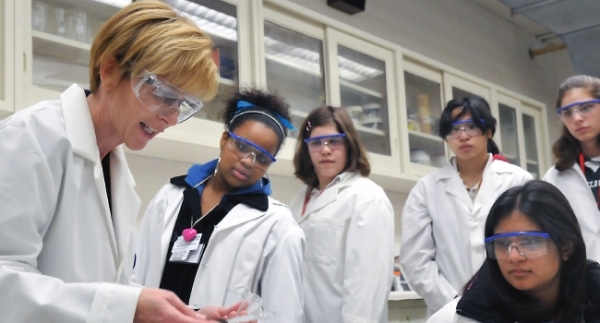"Our current Science offering concentrates on quality over quantity."
Unlike some other subjects, ‘Science’ is likely to still be ‘Science’ in any reshaped format. There are fundamental topics, ideas and themes which run through any modern curriculum with each periodic review offering a great chance to refine, update and renew. From my perspective, the key challenges for the Science teaching community in 2015 are principally the move back to a Combined Science and the removal of coursework as part of a distinct assessed unit in future courses.
Those of us who have been teaching for long enough will remember the days of a combined science style course. As I’m sure is the case across the country, at my school, Firth Park Academy, this latest change will present significant challenges, but one we are determined to meet head on. Our current Science offering concentrates on quality over quantity, one which other similar schools in challenging contexts may well match in the movement to the new Progress 8 measure. Most of our students take Core Science at the end of year 11, with a minority also studying Additional Science. The final group, 13% of our cohort, are our Slovakian Roma students who study an Entry level qualification from which they can graduate as their English improves.
The numbers taking Core and Additional have doubled following a drive on ‘quality first teaching’ throughout the year groups. However, all of our students taking a demanding course with increased rigour and content is going to be a big ask. In preparation for this, we have made a conscious decision to go back to basics through our strategic planning. One of the most significant reasons for our dramatic improvement in student attitudes and progress in Science over the past 12 months has been the teaching team putting practical work at the centre of everything we do. Using excellent, Science-specific CPD, delivered by the National Science Learning Centre, we have introduced more frequent and innovative activities.
Crucially, we have reflected on why we complete practical work. Starting with desired outcomes first, we knew we want our students to not only recall concepts and ideas but more importantly to understand them. Our annual review is a chance for us to further refine the practical offer, using all of the inspirational best practice showcased in documents such as the tri-annual Ofsted report ‘Maintaining Curiosity’, expert advice from both Sheffield Hallam and University and the Science Learning Centres. We are moving from a ‘join the dots’, menu-style practical work to genuine investigative scientific questioning, with students setting and exploring their own hypothesis and predictions.
In a comfortable school context, this development would be a low risk strategy. However, given our academy’s 66% pupil premium intake, average KS2 results ‘significantly below national’ and relentless pressure to improve standards, this is not a risk-free decision! After much discussion and planning, we feel strongly that this style of Science delivery will both continue to improve already excellent student attitudes, while building in student resilience, independence and intellectual curiosity.
In addition to ensuring our students have their brain ‘on’ and engaged in Science, we’re also linking more closely with the Maths department to ensure we’re supporting each other’s teaching with the greater degree of numeracy challenge and with English and other departments, through professional enquiry group research based staff developments to improve the ability of our students to match the increased demand in literacy.
The second major element is the removal of coursework as its own distinct part of the Science exam system. In preparation for a recent consultation meeting with Ofqual, I looked to gauge opinion, through Science networks, social media and conversations with teachers in different schools. The response was generally mixed, with many seeing the advantages of not having to plough through a well-meaning but prescriptive coursework system, which had a focus generally on attainment rather than scientific curiosity and rigour. However, many concerns were raised especially with the reduction of the perceived importance of practical work and therefore potential capitation cuts and removal of Science specific CPD. One would sincerely hope that headteachers will continue to understand that Science is at its best when delivered through practical experience.
"I looked to gauge opinion, through Science networks, social media and teachers."
The response to these issues was taken seriously, in my opinion, by the team at Ofqual. Their compromise solutions, which include a set of practical activities to be completed by a school and assessed as part of the terminal examination, does seem to have merit. How the quality assurance system could work is up for discussion, but again there seemed to be an understanding that ‘less is definitely more’ when it comes to teacher’s paperwork. So, a move in the right direction? A bit early to tell for certain, but it feels this is a definite opportunity to improve the credibility of assessment of Science learning, without reducing the importance of practical work.
Will all of these national and departmental developments work? Well, only time will tell with that one! In our academy the students are more engaged, according both to their feedback and that of more formal school quality assurance, with their Science learning. Now we’ve got their attention, we’re moving in the right direction to take the learning from at times superficial regurgitation to greater depth and complexity. The team continue moving together to put these improvements in place, so with a fair wind and calm seas, this journey should keep moving towards our goal of producing high quality Scientists, ready to meet the enormous opportunities available to STEM apprentices and students over the next decade.
So my advice would be to grab the dog lead (other pets will suffice!), take some time out somewhere quiet and reflect on why your students are taking Science. How will you fill that journey with awe, discovery and intellectual stimulation? Continue to develop your team, teachers and students to enable them to move into a STEM career. The rewards will be rich for all.
Top 5 tips
1. Review your content. What needs teaching in the new Combined and Triple Science? How does it fit with the current offer?
2. Retell your story. What’s the narrative for your Science offer? How can you make it fit with the new content?
3. What’s your ‘Golden Thread’ which runs through your Science course? Is it Scientific curiosity? Is it practical investigation? Think about why!
4. How are you going to build the literacy and numeracy skills to tackle the more challenging courses?
5. Start early! We may be a year behind our colleagues in English and Maths but that’s no excuse to miss the boat! Get planning this Summer.
How do you keep your department fresh? Let us know in the comments.


















